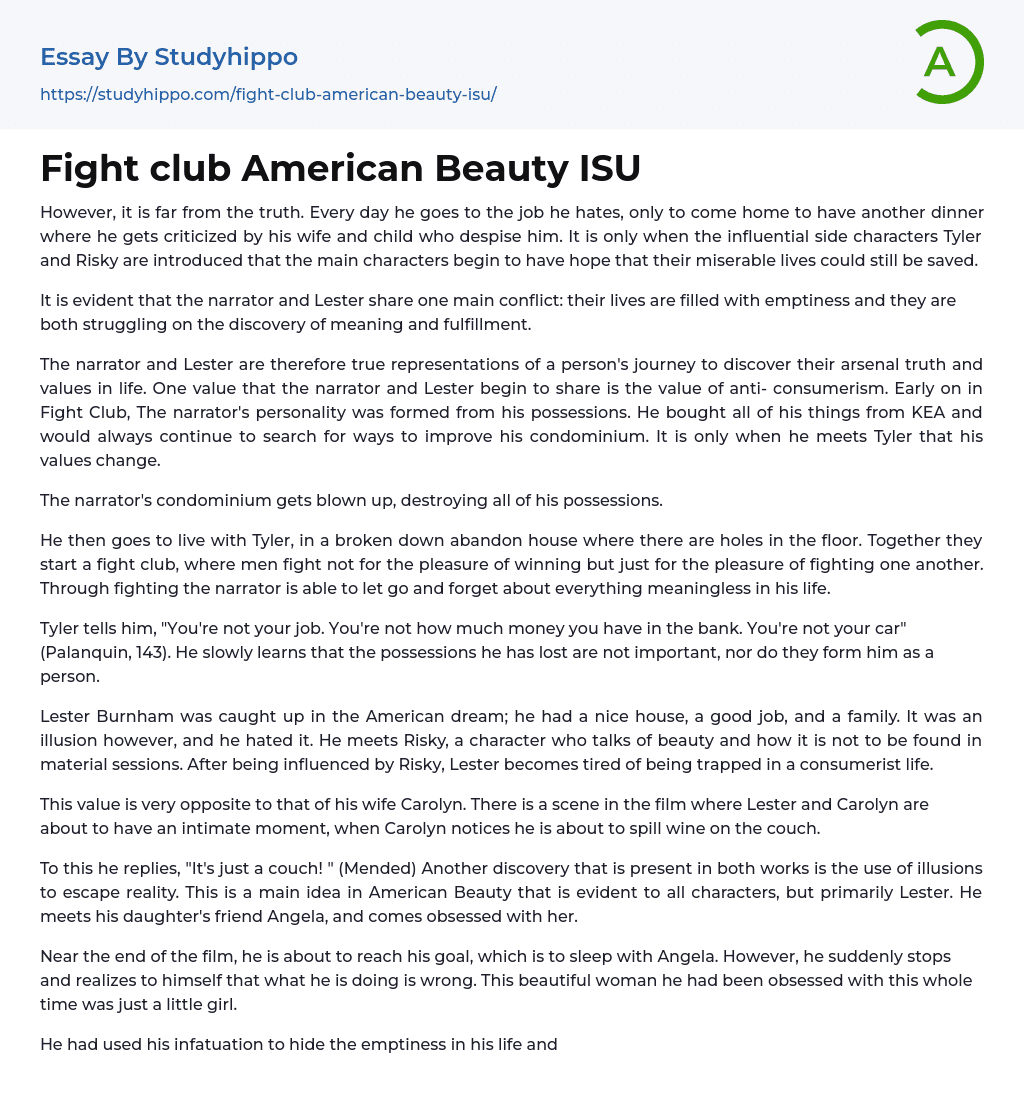Despite what is commonly believed, the main character in Fight Club doesn't have a happy life. He goes to a job he hates every day, only to return home and face criticism from his family. It isn't until the introduction of the influential characters Tyler and Risky that some hope for a better life arises. Both the narrator and Lester share a common struggle of feeling empty and lacking fulfillment. They are symbolic of the journey one must undergo to discover their own truth and values in life. One shared value is anti-consumerism, which is introduced when the narrator's possessions, which he had bought from KEA to improve his condominium, get destroyed. He then moves in with Tyler into a rundown house and they start a fight club where men fight not for the thrill of winning but fo
...r the sake of fighting. Through fighting, the narrator is able to let go of everything meaningless in his life and Tyler tells him that he is not defined by his job.According to Palanquin (143), one's worth is not based on the amount of money in their bank account or their possessions. This message resonates with Lester Burnham, who was initially caught up in the illusion of the American dream with a nice house, family, and good job. However, after being influenced by the character Risky, he starts to question the consumerist lifestyle he leads and realize the importance of genuine beauty that is not found in material possessions. Lester's wife Carolyn embodies the opposite value, as evident in a scene where he dismisses a wine spill on the couch as "just a couch!" (Mended). Both work
also explore the idea of using illusions to escape reality, exemplified by Lester's obsession with his daughter's friend Angela. In the end, he realizes that his infatuation was just a cover for the emptiness in his life and a motivator for change.The narrator in Fight Club is consumed by many illusions, including his ultimate illusion of Tyler - an alter ego that he created for himself because he was lost and searching for guidance. Tyler represented everything that the narrator was not: smarter, better looking, free-spirited, and funny. The narrator hoped to be rescued from the problems in his life by creating Tyler. One of Tyler's ideas was that individuals are not important, and that everyone is part of the same compost pile. This led the narrator to forget about materialistic things and find his core being. Lester also valued personal freedom, which is exemplified by his relationship with Risky. Lester was influenced by Risky, which was evident in a scene where Lester smoked marijuana with him behind a catering restaurant. Risky's boss confronted them and Risky responded by telling him to leave him alone if he did not want to pay him.Lester decides to live life according to his own rules, which includes quitting his job, smoking marijuana, buying a Pontiac Fired, and working at a fast food joint. This idea is prevalent in Fight Club, where Tyler believes that hitting rock bottom is necessary for personal freedom. The narrator learns this concept through a painful chemical burn on his hand and embraces the idea that losing everything is the key to being truly free. Similarly, in Palanquin and Mended, Tyler and Risky assist
the narrator and Lester in finding meaning in their lives. The awareness of death is essential for the narrator to find purpose in life, as Tyler believes that knowledge of mortality is necessary for living a fulfilling life. Together, the narrator and Tyler encounter death face-to-face, allowing them to discover true meaning in their lives.
The character Risky in American Beauty greatly influences Lester's discovery of beauty and meaning in life. Through watching all of Risky's videos showcasing everyday life, Lester starts to understand the significance that he had previously overlooked. With this newfound understanding, Lester finds a deeper and more beautiful meaning to his life, expressing that it's hard to stay angry when there is so much beauty in the world. He perceives all the beauty at once, sometimes overwhelming him, yet he eventually learns to let go and flow with it. Having discovered true values, such as gratitude for every moment, Lester achieves fulfillment and appreciation for life's subtle beauty. In Fight Club and American Beauty, Palanquin and Mended craft two characters who embark on a journey of self-discovery and personal values; despite finding similar values along the way, they both reach different conclusions.
- Cosmetics essays
- Skin care essays
- Makeup essays
- 12 Angry Men essays
- A beautiful mind essays
- A Separation essays
- Alfred Hitchcock essays
- American Beauty essays
- American Films essays
- Animation essays
- Avatar essays
- Blade Runner essays
- Bollywood essays
- Bond essays
- Bridge essays
- Cinema Of The United States essays
- Comedies essays
- David essays
- Dead Poets Society essays
- Do The Right Thing essays
- Documentary essays
- English-Language Films essays
- Erin Brockovich essays
- Film Analysis essays
- Film Editing essays
- Film Noir essays
- Film Techniques essays
- Finding Forrester essays
- Forrest Gump essays
- Gattaca essays
- Gladiator essays
- Glory essays
- Good Will Hunting essays
- Hamilton essays
- Hollywood essays
- Horror essays
- Jaws essays
- King kong essays
- Like Water For Chocolate essays
- Looking For Alibrandi essays
- Martin Scorsese essays
- Melodrama essays
- Monster essays
- Moulin rouge essays
- Movie Analysis essays
- Movie Review essays
- On The Waterfront essays
- One Flew Over The Cuckoo'S Nest essays
- Our day out essays
- Pearl Harbor (Movie) essays




